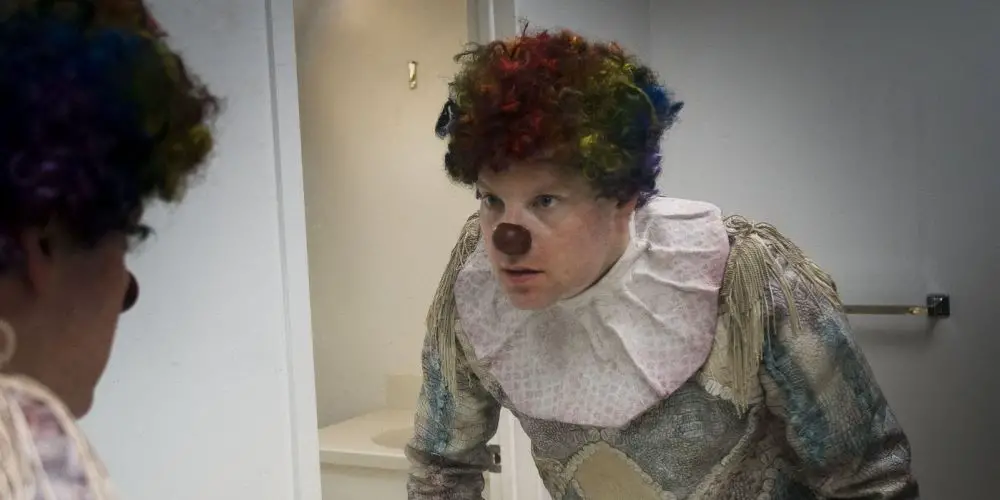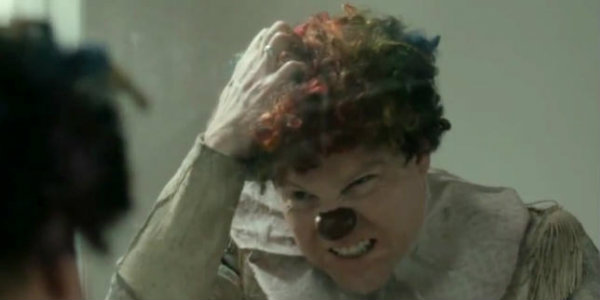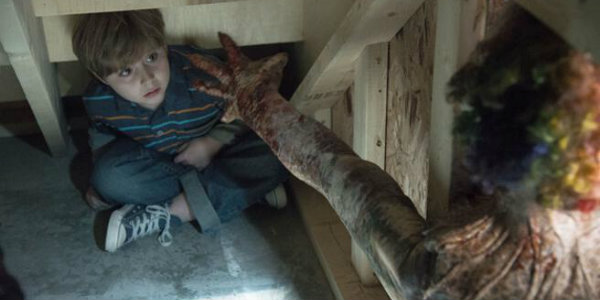CLOWN: A Body Horror Comedy

English Major, Film Buff, and Citizen of the World, Sean…
Written and directed by Jon Watts with co-writer Christopher Ford back in 2014, Clown has been in the offing for some time now. Originally conceived in 2010 as a fake trailer for a forthcoming feature attraction fictively produced by contemporary horror genre guru Eli Roth, Watts‘ first feature length production is a mixed bag. Blending various elements of body horror with the basic thematic structure of a domestic comedy, Clown is more silly than it is scary.
Even as Clown flirts with taking on the mantle of such body horror staples as David Cronenberg‘s classic film of 1986, The Fly, Watts‘ tale of a well-meaning father who slowly turns into a Nordic monster of mythological proportions is insipid by comparison. The young American director may have received some notice for his follow-up feature from 2015, Cop Car, but the overall quality of his preceding effort doesn’t bode well for his forthcoming work on the Marvel Studios superhero tentpole, Spider-Man: Homecoming.
Coulrophobia
Coulrophobia, or the psychological fear of clowns, was perhaps popularized most pervasively following the publication of best-selling horror writer Stephen King‘s 1986 novel, It. The phobia itself is believed to stem from the way in which clown’s facial features and specific body parts are exaggerated and distorted for comic effect. Unfortunately, that same visual cue meant to illicit humor and good will can be simultaneously perceived as a monstrous deformity synonymous with terror.

As is the case in King‘s classic work of horror-fantasy, clowns are often the source of childhood trauma that results in an ongoing paranoia and anxiety going into adulthood. Pennywise the Dancing Clown terrorizes the local children of Derry, Maine in It to such an extent that his broad forehead and bulbous red nose became equated with fear. As for everyone else who grew up with the same story and character of horrific menace in the real world, the same thing has happened for clowns in general.
Taking obvious thematic cues from King‘s classic work of horror-fantasy, Watts recasts what has become a popularized cultural fear of clowns against the realm of psychological terror. Less a horror movie than it is a hyperactive satire of the phobia in general, Clown is at once a celebration of what has become less of a visceral fear than it is a signifier of a very specific social chachet. The fear of clowns has become so culturally pervasive that producing a horror movie where that feeling is anthropomorphized thus feels like the natural next step to take.
But in Watts‘ blasé attitude towards the subject, Clown struggles to find much in the way of even thematic ground as a horror film. Depicting a fairly familiar story of a down on his luck father desperately trying to reconnect with his wife and young son, Watts quickly derails what is a potentially heartwarming family comedy into the realm of outright, B-movie horror. The special effects work used to create the eponymous monster as it slowly transforms into a creature of ever greater monstrosity is impressive. Yet Clown lacks some of the punch more readily associated with the standard clown costume seen more readily at any average children’s birthday party.
Comedy, Camp & Schlock
The greatest offense that Clown makes is in its assumption that its grand horror set pieces are as scary as they want to be. But like the poorly underutilized veteran actor Peter Stormare‘s performance throughout, Watts assumes that his film is working far more often than it actually does. As the titular monster of intimated menace, actor Andy Powers stumbles with a certain faltering step that might be read as impending danger, if it weren’t for the fact that he is caked in garish white makeup throughout.

What’s more, when Powers‘ final transformation is complete, and he has been turned into the Nordic beast of legend that Stormare warns him about, the effect is cinematically disorienting. Granted, the effects work in crafting the final movie monster is impressive. But the film in which it is finally introduced doesn’t quiet match its physiological terror. Powers work in Clown makes the beast out to be a source of faux antagonism, not inherent evil.
Unfortunately for Watts, even producer and proclaimed master of terror Eli Roth can’t save Clown from the adjacent horror genre realms of comedy, camp, and schlock. Even as Watts manages to deliver a far more menacing take on coulrophobia than the oft-cited made for TV adaptation of Stephen King‘s It did in 1990, at least Tim Curry understood that what makes clowns truly frightening comes in their determined attempts at seeming good will and humor.
Powers is ultimately sympathetic in the role of Kent McCoy, but Watts can’t quiet seem to find much focus in telling what is an otherwise fairly simple and straight forward story. The domestic fable that serves as the frame narrative to an overly self-conscious subversion of a popular cultural fear in Clown at times shines through the doom and gloom.

Nevertheless, Clown remains an otherwise tiresome genre affair, even with the addition of Roth as the production’s actual producer. Predictably accomplished, Watts‘ directorial debut would have been better off if it had been left alone as a fake movie trailer. As a feature length production, it exhaustively explores a fairly shallow premise to little reward.
Conclusion
Never quiet rising to the initial promise of its popular concept, Clown sees rising filmmaker Jon Watts offering audiences a beleaguered attempt at a first feature. Even as the movie wavers uncomfortably between outright comedy and subversive horror, Clown certainly paves the way for future genre film endeavors from the rising director.
Like Sam Raimi before him, perhaps Watts‘ work on Clown will inform some of the body horror elements inherent to Marvel Comics character Peter Parker in the forthcoming blockbuster film Spider-Man: Homecoming.
Are you afraid of clowns? If so, did you find Clown scary?
Clown is now available on Blu-ray and DVD in the U.S. Find international release dates here.
Does content like this matter to you?
Become a Member and support film journalism. Unlock access to all of Film Inquiry`s great articles. Join a community of like-minded readers who are passionate about cinema - get access to our private members Network, give back to independent filmmakers, and more.
English Major, Film Buff, and Citizen of the World, Sean K. Cureton is a born and raised Jersey Boy. Having received a B.A. in English from Rutgers University, Sean is proud to call the Garden State his home, equidistant from both the steps that made Sylvester Stallone a household name, and the park where Harry was cordially introduced to Sally, even if he’d prefer to a stay in state due to a certain fondness for a convenience store located in Leonardo, NJ. When he’s not in the multiplex, you can follow him on Twitter, @seankcureton.













